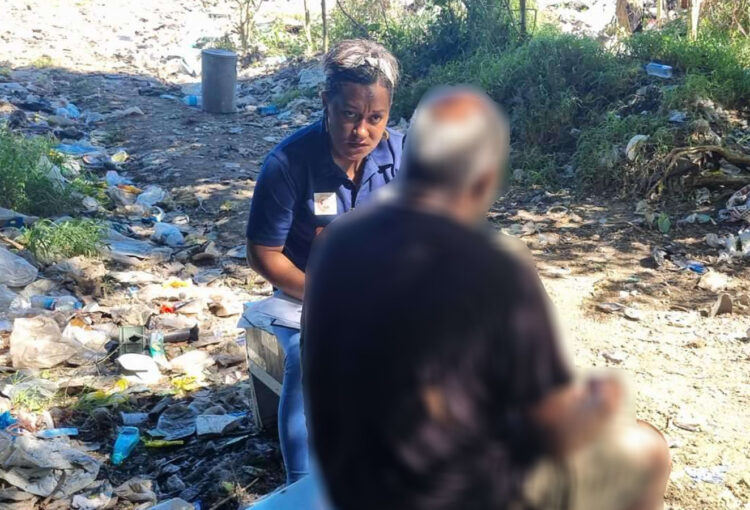Victims of elder abuse & neglect find a new lease of life through the waste-picking trade – Deo

Some senior citizens have ended up on our streets and resorted to waste picking to make a living as a direct result of elder abuse, social isolation, and absence of family support and connections, and financial support, revealed the Founder of the Pacific Recycling Foundation, Mr. Amitesh Deo.
The discoveries were made during the PRF’s Mapping Exercise of the Waste Collection Sector, which revealed that 47 percent of those involved in this sector are over the age of 55 with the oldest being 74.
He said elder abuse and neglect are a pressing concern and they continue to come across heart-wrenching cases where some senior citizens are now involved in waste picking for survival after being abandoned by their children or told by loved ones to fend for themselves.

“In a few cases, some senior citizens have started waste picking, not only for a living but because they have been able to find solace with fellow Collection Pillars of Recycling who operate in close-knit groups,” said Mr. Deo.
He said many times we fail to understand why some of our citizens are ending up on the streets picking up PET bottles or looking for recyclables from rubbish bins, and why they keep coming back to the streets when removed by authorities or reunited with their families.
“While extremely saddening, it is quite an interesting finding that those abandoned by their loved ones or have been victims of elder abuse have found a new lease of life through the waste-picking trade, and unknowingly, are also combating climate change by preventing waste from going to landfill and dumpsites,” said Mr. Deo.

The PRF’s Founder said more such findings will be revealed in the PRF’s Mapping Exercise Report which will be launched in September 2023, where they will also reveal plans on how the Foundation aims to provide structured support to these individuals.
The PRF’s Mapping Exercise of the Waste Collection Sector in Fiji has been done in partnership with Women in Informal Employment: Globalizing and Organizing (WIEGO) and through the support of partners such as Fiji Women’s Crisis Centre, Asco Motors, and Tourism Fiji.
Case Study 1:
This case study is about an elderly man who was dropped off at an elderly care home, unaware of what was about to unfold. His son had instructed him to wait outside while promising to return shortly. The man obediently waited outside with hope and anticipation, but the hours ticked by, and his son didn’t show up.
As the sun began to set, the old man’s confusion turned to worry, yet he clung to the belief that his son would arrive any moment. The compassionate staff at the elderly care home were aware of the situation and tried to console the old man, explaining the possibility that his son might not return as promised. But the old man remained adamant, holding on to the hope that his son would come for him.
After an arduous wait of eight hours, reality finally struck. The truth he had been avoiding sank in, and with heavy steps, he walked inside the elderly care home and made a call to his son. He asked his son to pick him up, to which his son replied reassuringly that he was on his way.
However, the promises proved empty once again, and the old man found himself alone in the unfamiliar environment of the elderly care home. Determined not to lose hope, he found solace in staying productive and active by collecting cans on the streets.
The old man sold the collected cans to Waste Recyclers Fiji Ltd (WRFL), earning a little money and contributing to waste management.
The day came, and he took his last breath. At his funeral, his family was nowhere to be found. The rituals of his passing were performed by the caring staff of the elderly care home, who felt a deep connection with him and regarded him as their own.
Case Study 2:
This case study is about a retired cane cutter, who dedicated his life to providing for his family. After retiring from cane-cutting, he hoped to spend his years surrounded by his children. However, fate had other plans for him, and his story takes a turn as he navigates the challenges of separation, survival, and the strong spirit that sustains him.
His unwavering commitment to his children’s education drove him to make significant sacrifices to ensure they received the best opportunities for a brighter future.
As his children grew older, they were drawn to urban opportunities and gradually migrated to different cities in pursuit of their dreams. While the elderly man understood their ambitions, the separation took an emotional toll on him.
It has been six years since the old man last spoke with his children. The once close-knit family connection had faded, leaving him feeling isolated and lonely.
In the absence of financial support and family connections, the man had to find a way to survive. He turned to collecting and selling PET bottles and selling them to market vendors as a means of sustenance.
The journey of the elderly man is one marked by both joy and sorrow. Memories of his children’s upbringing and their dreams filled his heart with love and pride. Yet, the pain of separation and loneliness weighed heavily on him, creating an emotional rollercoaste
